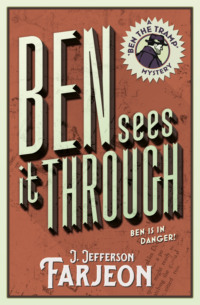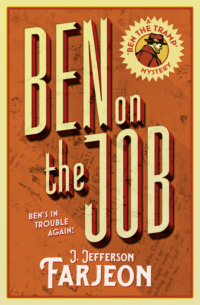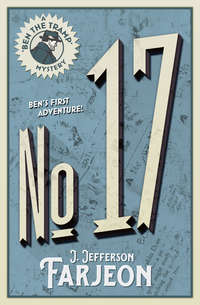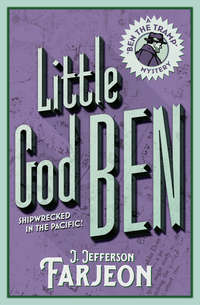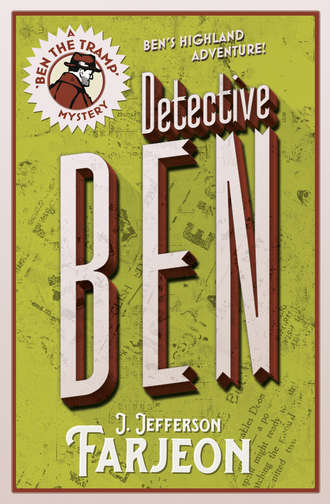
Полная версия
Detective Ben

J. JEFFERSON FARJEON
Detective Ben
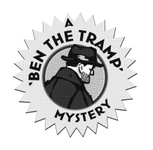

Copyright
COLLINS CRIME CLUB
An imprint of HarperCollinsPublishers Ltd
1 London Bridge Street
London SE1 9GF
www.harpercollins.co.uk
First published in Great Britain for Crime Club by W. Collins Sons & Co. Ltd 1936
Copyright © Estate of J. Jefferson Farjeon 1936
Cover design by Mike Topping © HarperCollinsPublishers Ltd 2016
Cover background images © shutterstock.com
A catalogue copy of this book is available from the British Library.
This novel is entirely a work of fiction. The names, characters and incidents portrayed in it are the work of the author’s imagination. Any resemblance to actual persons, living or dead, events or localities is entirely coincidental.
All rights reserved under International and Pan-American Copyright Conventions. By payment of the required fees, you have been granted the non-exclusive, non-transferable right to access and read the text of this e-book on screen. No part of this text may be reproduced, transmitted, down-loaded, decompiled, reverse engineered, or stored in or introduced into any information storage and retrieval system, in any form or by any means, whether electronic or mechanical, now known or hereinafter invented, without the express written permission of HarperCollins.
Source ISBN: 9780008156008
Ebook Edition © August 2016 ISBN: 9780008156015
Version: 2016-06-14
Table of Contents
Cover
Title Page
Copyright
Chapter 1: Happenings on a Bridge
Chapter 2: The Dark Journey
Chapter 3: Questions Without Answers
Chapter 4: The Man in the Next Room
Chapter 5: What the Morning Brought
Chapter 6: Acid Test
Chapter 7: The Signal Arrives
Chapter 8: Northward Through the Night
Chapter 9: Mr Smith, of Boston
Chapter 10: Exit Mr Smith, of Boston
Chapter 11: At the Black Swan
Chapter 12: MacTavish
Chapter 13: And So to Bed
Chapter 14: By Candlelight
Chapter 15: Friend in Need
Chapter 16: Ben Murders Himself
Chapter 17: Consultation in the Mist
Chapter 18: In the Wake of MacTavish
Chapter 19: The Old Man
Chapter 20: Someone at the Door
Chapter 21: Development of a Game
Chapter 22: The Plan
Chapter 23: Meanwhile, Outside—
Chapter 24: Dead Men’s Ears
Chapter 25: Down the Mountain
Chapter 26: Back to Muirgissie
Chapter 27: While the Moments Ticked by
Chapter 28: Last Lap
Chapter 29: Sir Ben
Keep Reading …
About the Author
Also in This Series
About the Publisher
1
Happenings on a Bridge
‘I wouldn’t mate, if I was you,’ said Ben. ‘It looks narsty!’
Thus, on a bridge at night, spoke one ragged man to another. Beneath them oozed dark water wending its inscrutable way towards the sea. Above them were the stars.
‘Mindjer, I ain’t sayin’ that life’s plumpunnin’,’ continued Ben, since his observation elicited no response. ‘If yer was to arsk me wot it was orl abart, I couldn’t tell yer, that’s a fack. Yer born without so much as by yer leave, and then they chucks yer this way and that till yer fair giddy. But—well, we gotter ’ang on—that’s right, ain’t it? England expecks every man to ’ang on, Gawd knows why, but yer can’t git away from it. ’Ang on!’ He paused to peer downwards at the inky river. ‘Any’ow, if I ever does pop meself orf, I’d sooner do it with a bang than a gurgle!’
He removed his eyes from the inky river. It wasn’t a pleasant sight. A moment later he was looking at another unpleasant sight. A small object gleamed up from the pavement by the stone parapet, and stooping to pick it up he discovered that it was a pin on which was mounted a miniature skull.
‘Well, I’m blowed!’ he muttered. ‘Do yer belong to one o’ them Suissicide Clubs?’
He held the hideous little decoration out to his ragged companion. Then he found himself staring at the most unpleasant sight of all. The dejected attitude in which his companion was leaning over the parapet was not that of a man contemplating death, but of a man already dead!
Ben had seen plenty of dead men in his time. It seemed to him that as soon as a person died, Fate rang for him to come and view the body. ‘Lumme, I’ve stopped noticin’ ’em!’ he had once boasted. But the boast had been bravado. He always noticed them, and they always affected his spine. This one affected his legs, as well, and before he knew it he was twenty yards away. Run first and think afterwards. That was his Napoleonic motto.
In the distance chimed a clock. The metallic notes hung slow and heavy on the air. One—two. Then from the direction of the chiming came another sound. The sound of an approaching car.
‘If yer runs, they’ll ’ave yer for it,’ Ben told himself with a gulp. ‘Stay where yer are and look ’appy.’
The only thing he had to be happy about was the substantial shadow in which he stood.
The approaching car drew closer. It also grew larger. Watching it from his shadowy sanctuary as it sped on to the bridge, Ben was impressed by the fact that it was not an ordinary car. That, perhaps, was not surprising, since nothing at this moment was ordinary. Ben’s mood was not ordinary. The bridge was not ordinary; it had become distorted into a grotesque, unnatural travesty of itself, painted with the sinister insecurity of nightmare colours. The little pin with its miniature skull was not ordinary. The ragged figure leaning limply against the parapet twenty yards away was not ordinary …
Nor was the behaviour of the car when it reached the ragged figure.
The car stopped suddenly. Why did it remind one of hospitals? Five men leapt out, violently invading the peace that had reigned uncannily a few moments before. Two of the men were policemen. Two of the others had an official atmosphere. The fifth had no official atmosphere. He wore an ordinary lounge suit and a squash felt hat and he stood a little apart, watching and smoking, while the others proceeded swiftly and smoothly with their business.
A stretcher appeared from the interior of the car. The ragged fellow into whose deaf ear Ben had tried to pass a little human comfort—posthumous comfort that only God had heard—was lifted on to the stretcher and carried into the car. Now there only remained his memory, and already the inevitable process of wiping out had begun. Ben stared at the portion of parapet against which the fellow had been leaning. Had he ever really been there? How many people would lean against the very same spot tomorrow, ignorant of their contact with tragedy?
Now the five men were talking. Their voices made a low, lugubrious buzz. Ben thought of bees. What happened when bees died? Did one bee report it, and others come along and take it out of the hive? It was a nuisance—Ben’s mind working like that! Jumping about just when he wanted to keep it steady. Perhaps it would have kept steadier on three good meals a day … Hallo! The car was filling up again. It was turning. In another moment the car, like the ragged fellow, would only be a memory, to recede unexplained into oblivion while life moved sluggishly on.
But Ben was wrong. This car would not recede into oblivion. It would remain for ever in his memory, and the thread that held him to it now, even after it had vanished from the bridge, was the man in the squash felt hat. He had stayed behind, having been temporarily obscured by the car while the others had re-entered it, and the steady glow of his cigarette made a pin-point in the dimness.
Ben found himself watching the glow. In a queer way it held him rooted, like a snake’s magnetic eye. Would it never move, and release him? If he moved first, out of the shadow, he would be spotted without a doubt.
‘Well, I ain’t done nothink!’ his thoughts suddenly rebelled. ‘I’m goin’!’
These unpleasant seconds were getting on his nerves. But before he could act upon his decision a voice called to him quietly across the road.
‘Stay where you are, or get a bullet!’
‘That’s done it!’ reflected Ben miserably. ‘Quick—think of a story!’
His mind refused to respond, and when the man in the squash felt hat, a revolver now added to his visible equipment, had traversed the intervening twenty yards, Ben had nothing between him and the law but the naked truth. And, after all, what was wrong with the truth?
‘Who are you?’ asked the man.
‘Bloke,’ replied Ben.
‘What sort of a bloke?’
‘’Ollywood star.’
You might as well die game. Life couldn’t be an utter failure if you made your last word a joke. It was a pity, though, that the man with the revolver didn’t smile at the joke.
‘Let’s try again,’ said the man. He had patience, anyway. ‘What are you doing here?’
‘Eh?’
‘What are you doing here?’
‘Nothink.’
‘Ever heard of the truth?’
‘Well, wotjer want me to say?’ demanded Ben. ‘Pickin’ ’ops?’
‘I’ve no doubt you’re quite good at hopping,’ remarked the man, dryly, ‘but two o’clock in the morning is rather late to be hopping about, isn’t it?’
‘It’s early fer me.’
‘Never go to bed?’
‘Yus. On’y they ain’t turned dahn the sheets yet at The Ritz.’
This time the man did smile. Ben smiled back, trying to consolidate the happier atmosphere. Funny, what a smile did! Couple of blokes meet, all glum. One of ’em smiles. Blinkin’ sun comes out!
‘Been here long?’ the man inquired next.
‘Depends wot yer call long,’ answered Ben cautiously. ‘Long fer a toothache, but not fer a nap.’
‘An hour?’
‘Lumme, no!’
‘Five minutes?’
Now for it! Ben took a deep breath and trusted to luck.
‘Abart that,’ he replied. ‘Or p’r’aps six.’
‘Six,’ repeated the man, thoughtfully. ‘Not longer?’ Ben shook his head. ‘But six was long enough for you to see something interesting?’
‘Yer mean—the deader?’
‘Yes. The deader?’
‘That’s right. I see ’im.’
‘Well?’
‘Well wot? I didn’t dead ’im.’
‘I know you didn’t.’
‘Go on!’
‘You couldn’t have.’
‘That’s right, sir. I didn’t of. But ’ow did you know? Every time anythink ’appens this side o’ China, it’s always Ben wot’s done it!’
‘Ben?’
‘That’s me. ’Aven’t yer never bought me on a postcard?’
The man in the squash felt hat stared at Ben rather hard. Solemnly Ben stared back. Then the man said:
‘I’ll tell you how I know you didn’t kill that fellow, Ben. I killed him myself.’
Ben opened his mouth and gaped at this self-described murderer. Lumme, he didn’t look that sort! But, of course, he had a revolver. Ben closed his mouth to swallow, then whispered hoarsely:
‘Coppers didn’t know, eh?’
‘Oh, yes, they knew,’ responded the man. ‘The chap was a wrong ’un.’
‘Well, I’m jiggered!’ murmured Ben. ‘And I thort ’e was jest a poor bloke like me!’
The man glanced at him sharply.
‘Oh—you knew something about him, then?’
‘Eh?’
‘What made you think he was just a poor bloke like you?’
‘Oh! Well—I come upon ’im, see? And findin’ ’im leanin’ there—well, orl crumpled like, I felt sorry fer ’im—you know, it bein’ late and orl that—and as I thort ’e was goin’ to commit suissicide I spoke to ’im—’
‘You spoke to him?’
‘I’m tellin’ yer. I didn’t know ’e was dead. I gener’ly seen ’em stiff. But, corse, that’s arter.’
‘Arter?’
‘Yus. Limp fust, stiff arter. “Doncher go chuckin’ yerself over,” I ses to ’im. “Stick it aht, mate,” I ses. That’s right, ain’t it? And then I looks at ’im a bit closer like—’cos ’e didn’t say nothink, see?—and, Gawd, ’e looks back at me from the nex’ Kingdom, if yer git me. It was—narsty.’
‘I’m sure it must have been,’ replied the man, with a note of sympathy. ‘And then what did you do?’
‘I arsk yer!’ answered Ben.
‘No, I’m asking you!’
‘Eh? Oh! Well, I come over ’ere.’
‘Why?’
‘’Cos ’e was over there.’
‘It sounds a good reason.’
‘You bet it was a good reason. If yer lookin’ fer a ’ero, guv’nor, it ain’t no good lookin’ at me! And arter that, the police car comes along, and now you’ve got the lot.’
‘No, there’s one more thing,’ said the man, lowering his eyes from Ben’s face.
‘Wot?’ asked Ben.
‘The thing you’ve got in your hand,’ responded the man. ‘How did you get hold of that?’
Now Ben lowered his own eyes, also.
‘Lumme, ’ave I still got it?’ he muttered. Clutched in his fingers was the ugly little skullpin. ‘Well, it ain’t my pickcher!’
‘Where did you find it?’
‘On the ground. By the dead bloke. I was jest ’andin’ it back to ’im when I fahnd out—’
He stopped short and shivered, recalling the unsavoury moment.
‘When you found out that he was past needing it?’ queried the man.
‘That’s it, guv’nor.’
‘But how did you know it was his?’
‘I didn’t know. Come ter that, I don’t know. But yer puts two and two tergether, doncher, so I jest thort it might be, seein’ as ’ow it was next to ’is boot, and thinkin’, don’t fergit, that ’e belonged to one o’ them Suissicide Clubs.’
The man nodded, and regarded the pin meditatively.
‘Yes, it was his,’ he said.
‘Then wotcher arskin’ me for?’ demanded Ben.
‘I didn’t ask you if it was his, I asked you how you knew it was his. It was in his coat. I expect it must have dropped out.’
‘Well, I don’t want it in my coat!’ declared Ben emphatically. ‘Yer can ’ave it fer a birthday present.’
But the man did not take the offering. Instead he continued to regard it for a few seconds, and then raised his eyes again to Ben’s face.
‘In your coat,’ he murmured. ‘That’s an idea!’
‘Oh! Well, I ain’t ’avin’ the idea!’ retorted Ben. ‘And if yer’ve finished with me, can I go?’
The man made no answer. He seemed to be thinking hard. Suddenly it occurred to Ben that perhaps he was entitled to ask a question.
‘Wotcher kill ’im for, guv’nor?’ he inquired.
‘It was self-defence,’ said the man.
‘Ah—’e went fer yer?’
‘That’s it.’
‘Why?’
‘Let’s say—a guilty conscience. I told you he was a wrong ’un.’
‘Yus. Well, if ’e went fer yer, they can’t ’ang yer.’
‘Thanks for the consolation. But if they’d wanted to hang me, would those bobbies have left me behind?’
‘So they wouldn’t!’
‘Getting wise?’
‘Yer mean, yer a ’tec?’
The man nodded. ‘But even detectives make mistakes sometimes—’
‘Go on!’
‘—and I showed myself a bit too soon. Don’t ask any more questions for the moment. Just stand by. I’m thinking. Maybe—you can help me.’
‘’Ow luvverly!’ murmured Ben.
A new sense of discomfort began to enter into him. He was no longer afraid of this man. He was no longer threatened by either a revolver or the gallows. But he was threatened by something else—something that lurked in the grinning little skull he was holding, and the detective’s last words, and the depressingly likeable quality of the detective’s eyes. He was the sort of man you might easily make a silly fool of yourself for. Yes, you wanted to be careful of him, or you’d promise yourself into a pack of trouble!
‘Got somethink to tell yer, guv’nor,’ said Ben.
‘What?’ asked the detective.
‘I’m a mug. I ain’t no good at ’elpin’.’
‘I’m not so sure.’
‘Well, see, I knows meself better. The on’y thing I’m really good at’s runnin’ away.’
‘Many a useful man begins by running away.’
‘Yus, but I’ve never stopped.’
‘You’re stopping now.’
‘Eh?’
‘Prove your words. I’m not keeping you. Run away. Pop off!’
‘Lumme, ’e’s doin’ me!’ thought Ben, wretchedly. ‘I toljer ’e would.’
‘You see, I know you better than you know yourself,’ continued the detective, after a pause. ‘I’m quite sure you know how to run away—’
‘I’ll die runnin’!’
‘—but if there’s any solid reason, you stand firm. You used one of my favourite expressions just now. “Stick it out.” Well, suppose I told you that, if you stick this out, you may bring off something that will make all the folk in Scotland Yard touch their hats to you every time you pass—’
‘Go on!’
‘—and that might bring you in, say, a fifty pound note at the end?’
‘’Ere, ’old me!’ gasped Ben.
The detective laughed softly. ‘Listen—I’m going to tell you a little story,’ he said.
‘I’ll bet it’s ’orrible!’
‘But you’d like to hear it?’
‘No. Go on.’
‘The fellow you spoke to and who has just been taken away had an appointment to meet somebody on this bridge between two and half-past. He was going to be identified by his rags and that skull-pin in your hand. I don’t know who the somebody is, but I do know that if I can track him to his source—that’s my present job—I’m on to a big thing.’
‘Yus, but—’
‘Wait till I’ve finished. What I’m going to propose to you is this. The somebody hasn’t turned up yet. Will you wait on this bridge, with that ugly brute of a pin in your coat, at the spot where you spoke to the late lamented, till half-past two—’
‘Late ’oo?’
‘The chap who’s dead. Nothing may happen. In that case the fee will have to be reduced, but you’ll still be on to a fiver for the easiest job you’ve ever had. But something may happen. The somebody may turn up, and be duped by your rags and your pin. In that case—Ben—if you play your cards cleverly and “stick it out,” eh?—the somebody may cart you back to the very source I’m looking for, and you will earn your couple of ponies.’
Ben wiped his forehead.
‘I admit it won’t be pleasant. But there will be glory and cash at the end of it—and, of course, I’ll be following you and looking after you—with this—!’
He raised his revolver again and, with grim and unappreciated humour, directed it towards Ben. Ben ducked involuntarily. An instant later the detective dropped to the ground, a crumpled heap.
Ben stared, stunned. ‘Wot’s ’appened to me?’ he wondered. The thing had been too swift and silent and unbelievable to have occurred outside a suddenly distorted brain. His mind ceased to function. Then he experienced a sensation as though he were coming out of gas. Truth developed out of numbness, and for several seconds he saw nothing, and thought of nothing, but the helpless, limp form of a young man whose eager voice still echoed in his ears, and whose friendly eyes had conveyed him out of terror into human warmth … He looked up to find other eyes upon him. The eyes of a beautiful woman in a dark, close-fitting coat.
She was standing beside a closed car. Had the car slipped up from the ground? He had not heard its approach. It had come as silently as the bullet. Or perhaps emotion had throbbed too insistently in his ears …
‘Quick!’ ordered the beautiful woman. ‘There’s not a moment!’
The door of the car was open. Ben looked at it; then at her; and then once more at the motionless heap on the ground.
‘Dead?’ said Ben thickly.
‘Quite,’ answered the woman. Her voice was low and rich, but as pitiless as cold steel.
‘Are you coming?’
Ben raised his face from death to life. Even in this dimness the woman’s eyes were dazzling. Ben’s heart turned black.
He nodded.
‘That’s right, miss,’ he murmured. ‘I’m comin’.’
2
The Dark Journey
The blackness in Ben’s heart was reflected in the car. The blinds were drawn, and as the car shot forward he found himself travelling in a darkness that seemed to creep right up to him and touch him.
By his side was the beautiful woman. Even in this enveloping darkness that affected both sight and soul he remained conscious of her beauty, just as he had been conscious of it while staring at death. It brushed his ragged sleeve as the car swung abruptly round a corner. It whispered to him through the fragrance of scent. It electrified the black atmosphere. Ben was not impervious to beauty, and he could stare with incoherent appreciation at a sunset, or watch little children dancing to a piano-organ, or pause, futilely desirous, at the photograph of a naughty chorus girl wrapped round a pound of cheese. But he hardened himself against the beauty he was now encountering, for it presided in enemy territory.
Ahead of him, driving, was another figure. A big, smudgy figure in a large overcoat. There was no beauty in this dim outline. It was sinister and forbidding, and reminded Ben of Carnera. He found himself wondering how long, if it came to a fight, he would be able to stand up against that massive frame. He worked it out at five seconds less six.
But the big figure in the large overcoat had another kind of tussle on at the moment. Emerging suddenly from his dazed thoughts, Ben became conscious of it when the car took another violent curve that brought the woman’s shoulder hard against his own. He heard a shout. The car swerved. He heard a shot. The car accelerated dizzily. Another corner. Straight again. Another corner. Straight again. Plop! Ting! Two little holes. One in the small window in the back of the car, one in the windscreen. A straight line between the two holes separated, and cleared by three inches, two heads.
‘All right, Fred?’ inquired the owner of one of the heads, coolly; while the owner of the other head thought, less coolly, ‘Lumme!’
The big figure in the large overcoat nodded. The car flew on.
‘And you?’ asked the woman, turning to Ben.
It was the first time she had addressed Ben since they had entered the car. ‘Now wot I’ve gotter do,’ reflected Ben, ‘is to pertend it ain’t nothink, like ’er!’ Aloud he responded, with elaborate carelessness:
‘Corse! ’Oo minds a little thing like that?’
She smiled. He could not see the smile, but he felt it. It came to you, like her scent.
‘Item, courage,’ were her next words. ‘Well, I’m glad you’ve got that, for you’ll need it.’
‘’Ooray,’ thought Ben.
‘But, after all,’ she went on, ‘one expects courage from those who have been awarded the D.S.O.’


